Review of political broadcasting rules
Sep 1, 2008 12:00 PM, By Harry Martin
The broadcast of political messages is covered by a complex set of laws and regulations. Station personnel involved with programming, sales and traffic should be aware during this election season that decisions about what ads to run, when to run them and how much to charge have broad implications under this regulatory scheme � summarized below:
Who’s who? One of the first things stations need to do is determine which elections are likely to generate requests for advertising time. On Nov. 4, 2008, the general federal election will include races for the offices of the president, vice president, the entire House of Representatives and one-third of the Senate. State and local offices also will be part of the Nov. 4 election.
All candidates for federal offices are entitled to reasonable access on commercial broadcast stations. That is, commercial radio stations must sell time within certain limits to candidates for president, vice president and the U.S. Congress. Candidates for state and local office have no similar right to reasonable access and stations can refuse to sell time for such races. If, however, a station sells ads to one candidate for a particular office, the equal opportunities rule requires that the station, on request, sell ads to all other qualified candidates for that office. Individuals other than candidates or their committees are generally not entitled to access. Stations are free to accept or reject issue ads as they see fit.
What’s what? One of the most important things a station can do prior to the election season is prepare a political disclosure statement � a written statement that will be provided to candidates that describes the station’s political ad rates, time classes and sales practices. The disclosure statement is not technically required under the FCC’s rules, but having a complete one distributed to key station personnel is essential for avoiding misunderstandings and mistakes in dealing with requests for political time.
How much? As part of preparing the disclosure statement, each station will need to determine the lowest unit charge (or LUC) to which qualified candidates are entitled. The LUC is the lowest rate of the station for the same class and amount of time for the same period. Not all political advertising is entitled to LUC rates. As a threshold matter, LUC rates only apply during the LUC windows. For the general election, the LUC window begins 60 day prior to the general election date (Sept. 5, 2008).
To qualify for the LUC rate, the advertising must include a use or appearance of a candidate whose voice or likeness is either identified or is readily identifiable in the spot.
Paperwork requirements. Stations must keep a political file for public inspection that includes records of all requests for political time made by or on behalf of any candidate and the disposition made of such requests. In addition, broadcasters must keep records of all paid political advertising that communicates a message relating to any political matter of national importance.
Disclaimer. This summary is by no means complete and should not be relied upon in making decisions about access to candidates or selling spots to candidates. Stations should contact the FCC and its publications, their state broadcast associations or counsel if there is doubt about how to deal with a political broadcasting issue.
Dateline
October 1 is the deadline for submission of biennial ownership reports by radio stations in Iowa and Missouri.
On October 1 radio stations with more than 10 full-time employees that are located in Iowa and Missouri must electronically file their Broadcast EEO Mid-Term Reports (Form 397) with the FCC.
Also on or before October 1 radio stations licensed in the following states must place their annual EEO Reports in their public files: Alaska, Florida, Hawaii, Iowa, Missouri, Oregon, Puerto Rico, Virgin Islands, Washington and the Pacific Islands.
Martin is a past president of the Federal Communications Bar Association and a member of Fletcher, Heald & Hildreth, Arlington, VA. E-mail[email protected].











